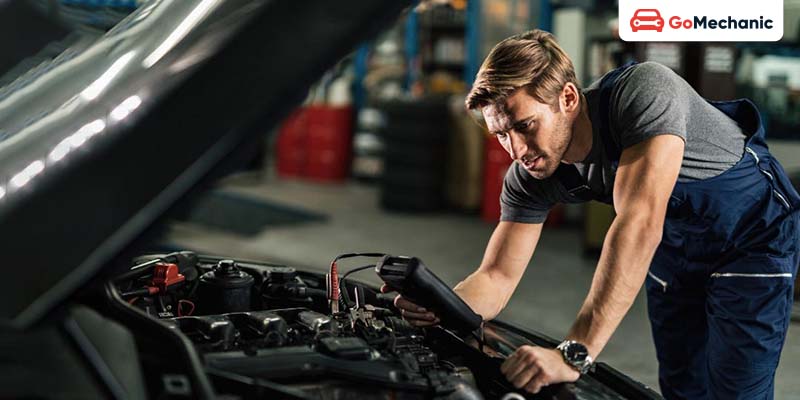With numerous mechanics claiming to offer the best services, making the right choice can be troubling. When it comes to car repairs, finding a trustworthy and skilled mechanic is crucial. In India, there is a widespread narrative that being a car mechanic is not a preferred career choice, leading to scepticism among people. By asking these essential questions, you can identify a mechanic who has a genuine attachment to their job and is committed to upward mobility in the field, instilling trust in their services.
Question 1: What Qualifications and Certifications Does the Mechanic Have?
Understanding the Importance of Qualifications
- Expertise: They’re trained to diagnose and repair issues accurately, ensuring your vehicle’s safety and performance.
- Quality Assurance: Working in certified facilities, they meet industry standards, using proper tools and techniques.
- Specialised Knowledge: They excel in specific areas like engine or electrical systems, addressing problems efficiently.
- Access to Resources: With access to technical manuals and tools, they stay updated on technological advancements.
- Warranty Protection: Their work maintains warranty validity, safeguarding against future issues.
- Trust: Their qualifications assure you of capable care, giving peace of mind about your vehicle’s maintenance and repairs.
Certifications to Look For
- ASE (Automotive Service Excellence): Shows they’re good at fixing cars.
- Manufacturer Certifications: Means they’re trained and approved by specific car brands.
- AAA Approved Auto Repair: Ensures they meet AAA’s quality and service standards.
- NAPA Autocare Center: Shows they meet NAPA’s high standards for repairs.
- Bosch Certified Technician: Shows their experts in Bosch car parts.
- I-CAR: Specialises in training for fixing car collisions.
- AAA Green Shield Certified: Means they’re environmentally friendly.
- ASA Certification: Shows they meet professional and quality standards set by ASA.
Question 2: Does the Mechanic Specialise in Your Car Make and Model?
- Expertise: They have deep knowledge in specific areas like engines or electrical systems, leading to more accurate repairs.
- Efficiency: Familiarity with common issues allows them to work faster and more effectively.
- Quality of Work: Focused efforts result in higher-quality outcomes, as they stay updated on the latest advancements.
- Access to Resources: Specialised tools and software enable quicker and more accurate repairs.
- Warranty Compliance: Ensures repairs meet manufacturer standards, preserving warranty validity.
- Peace of Mind: Their specialised skills provide confidence in addressing vehicle issues effectively, ensuring optimal care.
Question 3: What Type of Warranty or Guarantee Does the Mechanic Offer?
Importance of Warranty while choosing mechanic
- Warranty Validity: Ensure your warranty stays intact by using authorised mechanics, protecting you from unexpected repair costs.
- Manufacturer’s Specifications: Certified mechanics follow manufacturer guidelines, guaranteeing repairs meet the required standards.
- Quality Assurance: Authorised mechanics adhere to higher quality and professionalism standards, ensuring top-notch care with genuine parts.
- Peace of Mind: Trust that your vehicle receives expert service from certified mechanics, minimising future issues.
- Cost Savings: Authorised car mechanics can perform warranty-covered repairs at no cost, saving you money on covered services.
Understanding Guarantees
- Quality Assurance: Guarantees that repairs meet the standards, with issues fixed at no extra cost.
- Customer Satisfaction: They show the mechanic’s dedication to satisfying customers.
- Accountability: Mechanics are responsible for rectifying any issues promptly.
- Peace of Mind: Guarantees protection against poor work or faulty parts, easing concerns.
- Long-Term Protection: Some guarantees cover repairs for an extended period, ensuring continued reliability.
- Professionalism: Guarantees reflect the mechanic’s professionalism and commitment to quality service.
Question 4: How Transparent is a Car Mechanic About Costs and Procedures?
Transparency in Pricing
- Clear Understanding: Transparent pricing ensures customers know the repair costs upfront, avoiding surprises.
- Trust Building: Open pricing builds trust by showing there are no hidden fees, strengthening the mechanical-customer relationship.
- Informed Decision-Making: Transparent pricing allows customers to compare prices and make informed choices without worrying about undisclosed costs.
- Fairness: Everyone is charged the same price for the same services, promoting fairness regardless of background.
- Customer Satisfaction: Transparent pricing leads to satisfied customers who feel they’re getting a fair deal.
- Repeat Business and Referrals: Positive experiences with transparent pricing encourage customers to return and refer others, benefiting the mechanic’s business.
Clear Communication About Procedures
- Understanding: Clear communication ensures customers grasp the repair procedures, avoiding confusion.
- Transparency: Clear communication fosters trust by keeping customers informed about the repair process.
- Informed Consent: Customers can make informed decisions about repairs when procedures and costs are communicated clearly.
- Safety: Clear communication about procedures prioritises safety and reduces the risk of accidents.
- Efficiency: Clear communication streamlines the repair process, minimising delays and errors.
- Customer Satisfaction: When procedures are communicated clearly, customers feel valued and satisfied with the service.
Question 5: What Do Other Customers Say About Their Experience?
Importance of Customer Reviews
- Trust and Reputation: Reviews help gauge a mechanic’s trustworthiness and reliability, instilling confidence in their abilities.
- Quality Assessment: Customers can assess the service quality, staff competency, and repair effectiveness through reviews.
- Insight into Customer Experience: Reviews provide valuable insights into communication, professionalism, and overall customer service experience.
- Decision Making: Customer reviews assist in making informed decisions by weighing the experiences of others.
- Identifying Red Flags: Negative reviews highlight potential issues like poor workmanship or unprofessional behaviour, aiding in avoiding unreliable car mechanics.
- Continuous Improvement: Feedback from customer reviews helps mechanics identify areas for improvement, fostering continuous enhancement of services.
How to Research Customer Feedback
- Check online platforms like Google Reviews, Yelp, or Facebook.
- Visit specialised review websites such as Angie’s List or Trustpilot.
- Explore social media platforms for comments about mechanics.
- Look for testimonials on the mechanic’s website.
- Ask for referrals from friends or family.
- Visit the mechanic’s location in person.
- Identify patterns in feedback.
- Focus on recent and relevant reviews.
- Consider how the mechanic responds to feedback.
- Trust your instincts when evaluating feedback.
Conclusion: Making an Informed Choice
Choosing the right mechanic for your car involves a careful evaluation of their qualifications, specialisation, warranties, transparency, and customer reviews. By asking the right questions and doing thorough research, you can find a mechanic who is not only skilled and knowledgeable but also committed to providing excellent service and building a lasting relationship. This guide empowers you to make an informed decision, ensuring your vehicle receives the best possible care.







